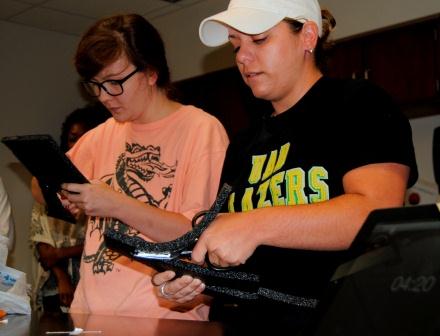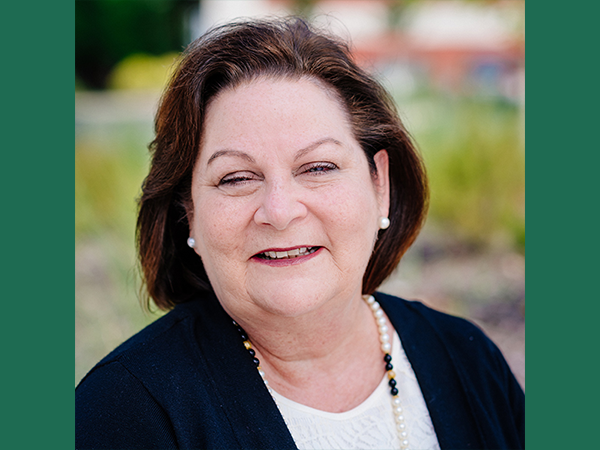 The assignment was simple. Okay, maybe not simple, but definitely basic. Students in the UAB School of Health Profession’s Department of Occupational Therapy class OT 673 were asked to make an assistive device that would help people with an injury or disability.
The assignment was simple. Okay, maybe not simple, but definitely basic. Students in the UAB School of Health Profession’s Department of Occupational Therapy class OT 673 were asked to make an assistive device that would help people with an injury or disability.But there was a catch – the students could only spend five dollars and it had to be constructed from scratch within five minutes. But if the names of their teams were any indication, then The Lollipop Guild, The Pirates of the Health Profession, The Lucky Seven, OTech, WCF+1 and Gandalf’s Gang would find creative ways to beat the clock and potentially help someone beat a challenge they face in life.
The tone of the day seemed to be sharp cutting objects. Pictured above, right, Lauren Ashley, wearing glasses, and Mandy Owen, UAB Blazers shirt, represented the OTech team in an effort to make flip flops for adults and children using only foam, a pot holder, head bands and ribbon.
 “The flip flops for adults are aimed at disease prevention,” said Owen, a first year student in the occupational therapy program. “The flip flops for children come from a silicon pot holder and it will provide extra traction for toddlers learning to walk and will protect their feet from the heat.”
“The flip flops for adults are aimed at disease prevention,” said Owen, a first year student in the occupational therapy program. “The flip flops for children come from a silicon pot holder and it will provide extra traction for toddlers learning to walk and will protect their feet from the heat.”The two made one adult flip flop within the allotted five minute window. They continued to work after the time ran out to show the class the same simple steps to make the toddler flip flops.
Gandalf’s Gang created the “Finger Blocker” which only required a glove and a pair of scissors. It took Courtney Barnett, pictured right, all of 15 seconds to make it and model it. However, the simplicity of the design masks the complexity of the problem solved.
“Clients with disabilities who use tablet technology may have poor finger dexterity, low strength and endurance or tremors which could cause them to trigger applications or hit buttons that they did not intend to activate,” said Barnett, a first year student in the occupational therapy program. “The Finger Blocker only exposes the tip of one finger and increases the chances that the user will only hit the button they want.”
 One of the trickier challenges of the class was an ADL (activities of daily living) cuff designed by The Lollipop Guild.
One of the trickier challenges of the class was an ADL (activities of daily living) cuff designed by The Lollipop Guild. “This is for someone who has had a stroke or spinal cord injury or another problem that prohibits them from grasping an eating utensil for self-feeding,” said Laura Nance, a first year occupational therapy student.
To build the ADL cuff required the MacGyver-esque supplies of a credit card, rubber bands, duct tape and a box cutter.
Laura Nance, pictured lower right, with a very concerned classmate, Rose Davis, was given the task of cutting a Parisian’s credit card with a box cutter. In about three minutes, Nance cut slits in the credit card, ripped two pieces of duct tape, placed the card on the tape, rubber bands around the card, the tape on top of the rubber band, cut more slits into the tape and then slid a spoon into the slits to be held by the rubber bands. Voila! An ADL cuff.
 Other devices that were created during the class today were a leg lifter made out of coat hangers and duct tape, a straw holder made out of a clothespin and a foam pencil grip and a playing card holder made out of egg carton.
Other devices that were created during the class today were a leg lifter made out of coat hangers and duct tape, a straw holder made out of a clothespin and a foam pencil grip and a playing card holder made out of egg carton. The class is taught by Deek Cunningham, MS, OTR/L, and Gavin Jenkins, Ph.D., OTR/L, both assistant professors in the Department of Occupational Therapy. According to Cunningham, this element of the course is designed to help students recognize that there are non-conventional ways to make a difference in people’s lives right now:
“For many clients who receive OT services, waiting for weeks while paperwork for devices is submitted and orders completed is not an option. We are trying to show our students that often we can make a difference in our client’s lives now, using simple or no tools and items we can find lying around our clinics or homes,” said Cunningham.
To see more photos from the OT 673 class event visit our Flickr page at http://www.flickr.com/photos/uab_shp/ and check out the Set called “OT’s $5, 5 Minute Challenge.”

